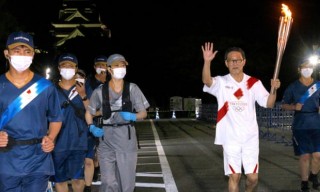Loading
Search
▼ Japan Extends Covid Emergency In Tokyo As Olympics Loom
- Category:Event
Government admits restrictions that had been due to end on 11 May have failed to stop rising infections
Japan has extended a coronavirus state of emergency in Tokyo and three other areas until at least the end of the month in an attempt to arrest a surge in cases less than 80 days before the start of the Olympics.
The prime minister, Yoshihide Suga, said the measures would remain in place in the capital, Osaka prefecture, and the neighbouring prefectures of Hyogo and Kyoto, the Kyodo news agency reported. Similar measures will be introduced in Fukuoka and Aichi prefectures, it added.
The economy minister, Yasutoshi Nishimura, conceded that targeted measures introduced at the end of last month that were due to end on 11 May had failed to check a dramatic rise in infections.
Restaurants serving alcohol and large shops have been asked to close – with fines imposed on these who fail to comply – while “dry” establishments are encouraged to close at 8pm.
Residents have been advised to avoid non-essential outings, but analysis of foot traffic suggests that many people are unwilling, or unable, to stay home.
Japan has reported 620,000 infections since the start of the pandemic, and 10,600 deaths – the highest in east Asia. While cases fell in Tokyo earlier this week, the drop has been attributed to far fewer tests than usual being conducted during the Golden Week holidays, which ended on Wednesday.
The city reported 907 infections on Friday, bringing its total to 144,441.
“Based on the analyses from various angles, my thinking is that we need an extension of the state of emergency,” Tokyo’s governor, Yuriko Koike, said before the measures were extended.
Osaka – currently the epicentre of Japan’s fourth Covid-19 wave – has run out of hospital beds for patients with serious symptoms and is in “quite a dangerous situation,” Nishimura said. Several people in the prefecture have died at home while waiting for treatment, according to reports.
Suga has come under fire for his response to the latest outbreak and Japan’s slow vaccine rollout, which began in mid-February. Poor planning and staff shortages mean it has yet to finish inoculating medical workers and has barely started administering jabs to people aged 65 and over.
So far 2.2% of the population has received at least one dose of the Pfizer vaccine, the only vaccine to have been approved by the health ministry. Japan has used just 15% of its stockpile, with 24 million doses sitting in freezers.
The latest attempt to bring case numbers down comes a day after Pfizer/BioNTech announced they had reached an agreement with the International Olympic Committee [IOC] to offer vaccinations to athletes taking part in this summer’s Games in Tokyo who are unable to receive jabs as part of their home country’s rollout.
The announcement drew criticism on social media, amid reports that Japanese Olympic athletes and officials would also be offered doses.
Opposition to Tokyo 2020 has intensified since nurses and other medical workers took to social media to object to requests to volunteer their services this summer.
An online petition calling for the Games to be cancelled has attracted more than 200,000 signatures in the space of a couple of days. The Change.org petition has attracted support at a faster pace than any other since the Japanese version of the platform was launched in 2012.
“We strongly call for the prevention of spread of coronavirus and protection of lives and livelihoods by using available resources to stop the Olympics,” said Kenji Utsunomiya, a prominent lawyer and former candidate for Tokyo governor who organised the petition.
On Friday, the head of the Tokyo 2020 organising committee, Seiko Hashimoto, said it would be “very difficult” to realise a planned visit to Japan by IOC president Thomas Bach from 17 May while parts of the country were under coronavirus restrictions.
The IOC and Tokyo 2020 organisers agreed to ban overseas sports fans from attending the Games but have put off a decision on Japanese spectators until next month.
The torch relay, which has been banned from public roads in several locations due to virus fears, faces further disruption. On Thursday, the governor of Fukuoka prefecture said it would be difficult to host the event over two days next week while the area was subject to emergency measures.
- May 7, 2021
- Comment (0)
- Trackback(0)


